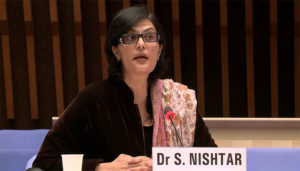
ISLAMABAD, Pakistan: The Prime Minister’s Special Assistant on Social Protection and Poverty Alleviation Dr. Sania Nishtar was invited to speak at the online launch event for the Global Panel’s new Foresight 2.0 report: ‘Future Food Systems: For people, our planet, and prosperity’.
The event was co-hosted by the Global Panel on Agriculture and Food Systems for Nutrition, and the Food and Agriculture Organization of the United Nations (FAO).
Being a member of the Global Panel’s High-Level Stakeholder Group who had contributed to Global Panel’s report, Dr. Sania Nishtar provided her perspectives of the report alongside Dr. Francesco Branca, Director of the Department of Nutrition and Food Safety, WHO, and Diane Holdorf, Food Director World Business Council for Sustainable Development.
Speaking at the high-level panel, Dr. Nishtar stated, “Policymakers must address planetary and dietary challenges simultaneously since they are so fundamentally interlinked.”
Further adding, she said, “The report makes concrete recommendations on the practical steps which need to be taken in a process of transition, leading to a transformed future food system. And, food system transformation cannot be achieved without ‘pro-poor’ policies that support economic growth as well as social protection policies.”
This event was chaired by the Director for Nutrition at the FAO Dr. Anna Lartey.
Dr. Anna Lartey highlighted key findings from the report and began the process of engaging decision-makers from government, the private sector, the donor community, and research with its recommendations.
The government of Pakistan has institutionalized the inter-ministerial ‘Pakistan National Nutrition Coordination Council’ (PNNCC), chaired by Prime Minister Imran Khan and there are eight Cabinet Ministers in the Council.
This is the first time in the history of Pakistan that this inter-ministerial set up has been created under the overarching Ehsaas framework to steer nutrition-specific agenda in the Country.
Another substantive initiative is the recent launch of Ehsaas Nashonuma that is a conditional cash transfer program pegged on addressing stunting and nutrition outcomes among children under two years of age, and pregnant and lactating mothers.
In the first phase, 35 Ehsaas Nashonuma Centers have been opened across nine districts of the Country.





